by Marc Dollinger
The first edition of Black Power, Jewish Politics challenged conventional understandings of American Jewish history during the 1960s.For the most part, American Jews have celebrated their historic civil rights-era alliance with African Americans, internalizing it as a normative part of American Jewish thinking, identity, and history. Challenging these assumptions, the book’s publication revealed added layers to the conventional story, revealing as well the complexities of writing an academic book about a political topic.
The book soon sold out of its first three print runs, gaining national attention for the ways it helped American Jews understand how the nation’s larger racial reckoning reflected American Jewish history as well. Readers learned surprising insights into white Jewish/Black relations from as early as the 1950s and why the alliance fractured in the mid-1960s. The book also makes the provocative assertion that the Jewish ethnic revival of the 1970s was linked to the strategies and tactics of the Black Power movement.
As its pages tell, the renewed American Jewish interest in Zionism followed, and mimicked,
heightened interest in Black nationalism. American Jews, long reluctant to express Jewish
politics in public, took to the streets by the thousands to demand the free emigration of Jews from the Soviet Union, emulating grassroots activism of the 1960s as well as Black Power-inspired ethnic pride. An American Jewish return to religious tradition followed a similar Afro-centric move. Even American Jewish moves to the political right modeled their thinking after Black radicals. Meir Kahane’s Jewish Defense League, for example, modeled itself after Oakland’s Black Panther party. The book highlights these connections and investigates the limits of white Jewish liberalism.
All was well and good until the academic gatekeepers determined that a new preface written for the book’s fourth printing pushed the thesis too far. The preface argued that post-World War II American Jews benefit from, and even reinforce, a system of white supremacy in their lived experiences. The establishment disagreed. An unknown power broker also protested my decision to apologize for having erased Black Jews from the book’s narrative. When the book went to print without its new preface, scholars in the field protested, sharing their upset in a national Jewish news story that itself spawned competing open letters and a series of op-eds. All in all, they asked: what is the most accurate telling of the American Jewish social justice past, and what are the obligations of academic presses to publish those truths?
Now published by NYU Press, the revised edition of Black Power Jewish Politics tells this entire story. It contains every word of the book’s first edition. Then, it includes a new epilogue that documents the dramatic post-publication story. Readers can finally read that forbidden preface, now called “the preface to the revised edition.” Finally, an afterword offers the thoughts, reactions, perspective and understandings of Ilana Kaufman, a Black Jewish woman who took issue with some parts of the book’s thesis just as she lauded its historiographic innovations. Ultimately, her coda to the revised edition shares her personal story and how the book’s successes and failures reflect and animate her own lived experience.
NYU’s revised edition proves a book about a book, the story of an historical manuscript that
became its own primary source document of twenty-first century American Jewish life. It brings the past to the present, in challenging and important ways.
Marc Dollinger is the Richard and Rhoda Goldman Chair in Jewish Studies and Social Responsibility in the Department of Jewish Studies at San Francisco State University and author of Quest for Inclusion: Jews and Liberalism in Modern America.



 What Makes a Story by Michael Bérubé
What Makes a Story by Michael Bérubé